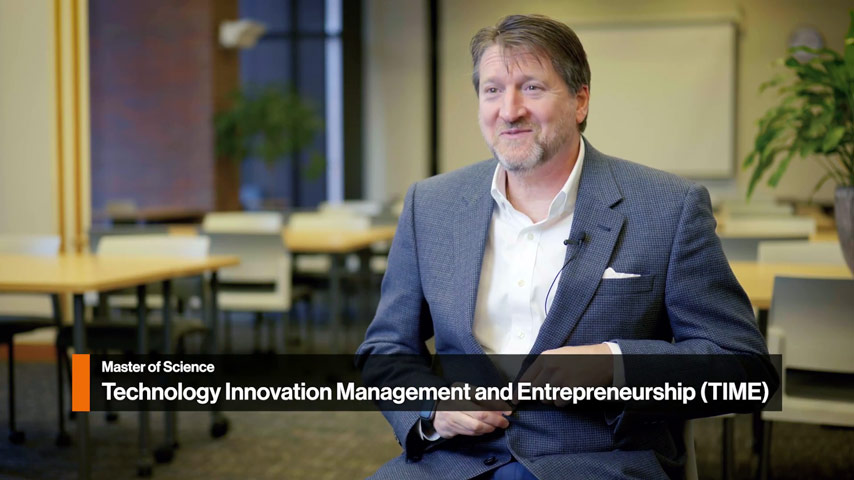Technology Innovation Management and Entrepreneurship Master of Science Degree

Technology Innovation Management and Entrepreneurship
Master of Science Degree
- RIT /
- Saunders College of Business /
- Academics /
- Technology Innovation Management and Entrepreneurship MS
RIT’s technology and innovation management enhances your ability to solve problems with unique and creative solutions preparing you to lead technological change in entrepreneurial ways.
$63.8K
Average First-Year Salary of RIT Graduates from this degree
#20
Best Master’s in Innovation and Project Management
Overview for Technology Innovation Management and Entrepreneurship MS
Why Study Technology Innovation at RIT?
STEM-OPT Visa Eligible: The STEM Optional Practical Training (OPT) program allows full-time, on-campus international students on an F-1 student visa to stay and work in the U.S. for up to three years after graduation.
Leverage RIT’s rich entrepreneurial culture: You’ll have access to the Simone Center for Innovation and Entrepreneurship, makerspaces, and Venture Creations Incubator.
Choose from two tracks: The technology management track and the technology entrepreneurship track provide immersive knowledge in key areas that impact technology innovation.
Technology innovation is fueled by technology, the arts, and design: Only at RIT can you connect with resources across the fields of business, science, technology, engineering, and design.
Technology entrepreneurship and innovation management are key business drivers in all industries as new products and services rapidly improve our lives in significant ways. Technology innovation managers and entrepreneurs who know how to lead technological change in entrepreneurial ways are in high demand to capitalize on process and product development opportunities. As an entrepreneur and innovator, you will be part of today’s innovation management as you identify problems and view them through the lens of technology innovation in an effort to develop unique and creative solutions.
RIT’s Technology and Innovation Management Master’s
Managing technology and innovation requires the skills to create value for your startups or entrepreneurial organizations. This entrepreneurship master’s offers opportunities to engage with business leaders and entrepreneurs, learn from business coaches and mentors, and capitalize on the developmental opportunities available on campus. You can leverage the robust technology environment at RIT and emerge as a business leader who can lead technological entrepreneurship by solving problems, inventing, creating innovative products and services, and commercializing their ideas.
Successful technology and innovation management students often have backgrounds in business or technology. They are interested in managing innovation, keen to lead and manage technological innovation, manage product development, eager to implement innovative ideas, and passionate for innovation and entrepreneurship. They seek to create and/or run an entrepreneurial venture, are getting ready to lead a small business, and have an interesting idea they are looking to convert into an innovative product or service. As a technology and innovation management student you will:
- Develop strategies for innovation
- Manage innovation projects
- Create and lead technology entrepreneurship
- Commercialize products
- Generate seed funding for start-ups
- Develop a viable business model
- Use analytics to make business decisions
- Identify businesses opportunities globally
Tracks
Two tracks cater to the unique needs of innovation managers and technology entrepreneurship.
- Technology management track: Designed to equip you with advanced skills in product development and data analytics enabling you to address organizational management and strategy needs.
- Technology entrepreneurship track: Equips you with skills required to start and manage new ventures utilizing research and marketing analytics, evaluate market options, and build strategy to capitalize on the options.
Access to Industry Technology and Resources
Capitalize on a rich entrepreneurial culture on campus, with full access, hands-on exposure to facilities such as the Simone Center for Innovation and Entrepreneurship, where you engage with:
- Industry experts and innovation coaches who provide one-on-one coaching and mentorship to develop your idea or start-up
- Idea labs where students get to solve actual problems of organizations and businesses
- Student Accelerator program where students get paid to develop their business concepts to seek angel investment
- Programs that solve real world challenges or teach students to raise funds to create and manage their own ventures
- Tiger tank competition where students pitch their early-stage product or service business idea to a panel of judges for prize money
Additional resources include world-class makerspaces; Venture Creations, RIT’s business incubator; and MAGIC Spell Studios, an entrepreneurial and commercial production studio. Teachers, industry mentors, an applied approach, and access to science, technology, engineering, and design resources prepare you to focus on entrepreneurial and innovation processes by which inventions and creative new ideas are brought to market.
Careers and Experiential Learning
Typical Job Titles
| Business Model Designer | Change Agent | Business Development Lead |
| Innovation Analyst | Venture Architect | Product and Integration Lead |
| Business Operations Planner | Business Analyst | Product Manager |
| Digital Transformation Strategist | Chief Technology Officer |
Cooperative Education and Internships
What makes an RIT education exceptional? It’s the ability to complete relevant, hands-on career experience. At the graduate level, and paired with an advanced degree, cooperative education and internships give you the unparalleled credentials that truly set you apart. Learn more about graduate co-op and how it provides you with the career experience employers look for in their next top hires.
Co-ops and internships take your knowledge and turn it into know-how. Business co-ops provide hands-on experience that enables you to apply your knowledge of business, management, finance, accounting, and related fields in professional settings. You'll make valuable connections between course work and real-world applications as you build a network of professional contacts.
Cooperative education is optional but strongly encouraged for graduate students in the MS in technology innovation management and entrepreneurship.
Technology Entrepreneurship and Innovation Management Careers
Graduates of RIT's master of science in technology entrepreneurship and innovation management are prepared for outstanding career opportunities across all industries. Our alumni are employed at diverse firms such as Excellus BlueCross BlueShield, DataKarma Consultancy, and more. Our Management Advisory Board helps students prepare for their careers by ensuring the curriculum is continuously updated to meet employers needs while providing networking and mentorship opportunities.
Featured Work and Profiles
-
Confidence and Tenacity: Saunders Fuels DataKarma Launch
Bhuvish Mehta ’23 "I could not have asked for a better support system than at Saunders College and Simone Center [for building and supporting my own business]."
Read More about Confidence and Tenacity: Saunders Fuels DataKarma Launch -
Research Insights: Balancing innovation and sustainability
Manlu Liu, John Tu Balancing innovation and sustainability in consortium-based open source software development. Can exploration and exploitation be balanced effectively?
Read More about Research Insights: Balancing innovation and sustainability -
Research Insights: Wearable tech: “I want to live to be 100!”
Fitbit, brand communities, and the transhumanist vision
Read More about Research Insights: Wearable tech: “I want to live to be 100!” -
Research Insights: “Alexa, lock my front door”
Emi Moriuchi Voice conversation agents, home security, and customer satisfaction.
Read More about Research Insights: “Alexa, lock my front door” -
Research Insights: Coming full circle
Clyde Eirikur Hull Exploring circular economy opportunities.
Read More about Research Insights: Coming full circle -
BTU in Tbilisi: Global Learning Sparks Entrepreneurial Drive
Mariam Sharangia ’21 "The available infrastructure, content, and super friendly and open staff create a secure and nurturing environment for one to innovate and experiment with new ideas."
Read More about BTU in Tbilisi: Global Learning Sparks Entrepreneurial Drive
Curriculum for 2025-2026 for Technology Innovation Management and Entrepreneurship MS
Current Students: See Curriculum Requirements
Admissions and Financial Aid
This program is available on-campus only.
| Offered | Admit Term(s) | Application Deadline | STEM Designated |
|---|---|---|---|
| Full‑time | Fall | Rolling | Yes |
| Part‑time | Fall or Spring | Rolling | No |
Full-time study is 9+ semester credit hours. Part-time study is 1‑8 semester credit hours. International students requiring a visa to study at the RIT Rochester campus must study full‑time.
Application Details
To be considered for admission to the Technology Innovation Management and Entrepreneurship MS program, candidates must fulfill the following requirements:
- Complete an online graduate application.
- Submit copies of official transcript(s) (in English) of all previously completed undergraduate and graduate course work, including any transfer credit earned.
- Hold a baccalaureate degree (or US equivalent) from an accredited university or college. A minimum cumulative GPA of 3.0 (or equivalent) is recommended.
- Submit a current resume or curriculum vitae.
- Submit a personal statement of educational objectives.
- Letters of recommendation are optional.
- Entrance exam requirements: GRE or GMAT required for individuals with degrees from international universities
- Submit English language test scores (TOEFL, IELTS, PTE Academic, etc.), if required. Details are below.
English Language Test Scores
International applicants whose native language is not English must submit one of the following official English language test scores. Some international applicants may be considered for an English test requirement waiver.
Duolingo (DET): 130
IELTS: 6.5
LanguageCert Academic: 74
PTE Academic: 60
TOEFL: 88
International students below the minimum requirement may be considered for conditional admission. Deaf and hard-of-hearing test takers with significant hearing loss do not need to take the listening and speaking sections for the TOEFL and IELTS. Each program requires balanced sub-scores when determining an applicant’s need for additional English language courses.
How to Apply Start or Manage Your Application
Cost and Financial Aid
An RIT graduate degree is an investment with lifelong returns. Graduate tuition varies by degree, the number of credits taken per semester, and delivery method. View the general cost of attendance or estimate the cost of your graduate degree.
A combination of sources can help fund your graduate degree. Learn how to fund your degree
Accreditation
Related News
-
June 13, 2024

Saunders Graduate Programs Ranked by Eduniversal 2024
Saunders College of Business continues to be a leader in graduate programs nationally and internationally.
-
June 3, 2024

2023-24 Accomplishments from Saunders Students
If you are a student at Saunders College and have exciting news to share, email communications@saunders.rit.edu.
-
May 29, 2024

2023-24 Alumni News and Recognitions
Submit your latest career move or latest achievement to communications@saunders.rit.edu.
Contact
- Delaney Ball
- Assistant Director
- Office of Graduate Admissions
- Enrollment Management
- 585‑475‑6933
- Delaney.Ball@rit.edu
- Matthew Cornwell
- Associate Director of Student Services
- Student Services
- Saunders College of Business
- 585‑475‑6916
- mcornwell@saunders.rit.edu
Saunders College of Business





















